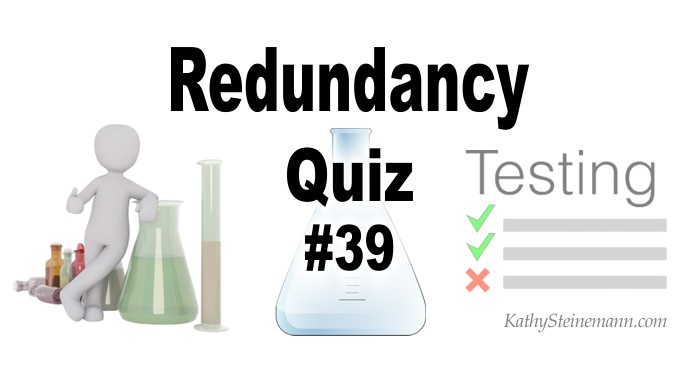
What Are Redundancies?
These nuisances are superfluous words or phrases also known as pleonasms. Rather than augment writing, they slow action scenes and increase word count — without adding constructive details.
About The Quiz
This quiz, the thirty-ninth in its series, offers ten sentences containing redundancies, and ten suggested solutions.
They are edited examples from books, news media, television shows, and overheard conversations.
The Answers Are Often in the Definitions
It’s time to track down and find those unwarranted redundancies.
In most cases, you should recognize the superfluous words when you scrutinize the definitions.
And maybe your muse will find story ideas among the changes and suggestions.
Can You Find Every Redundant Word or Phrase?
- We’re not exactly sure why the formula won’t work.
- In the next two months that followed, three more people were attacked.
- They surprised her with a puppy, out of the blue.
- He reflected back on his previous performance and devised several improvements.
- The gown’s long train billowed out behind her.
- At this current rate, we’ll be lucky to finish before the boss returns to his desk.
- It’s not a panacea for all of society’s problems, but it’s an initial first step.
- Bright sunlight streamed in through the window.
- The bank foreclosed on the property without advance notice.
- There are no clues whatsoever to link these two events together.
The Writer’s Lexicon series
and additional resources on my Facebook page.
Suggested Edits
Edit #1:
We’re not exactly sure why the formula won’t work.
sure: certain; positive; clear; in no doubt
exactly: certainly; positively; totally
Alternate wording: We’re [uncertain, undecided, unsure] why the [calculations, code, computations] won’t work.
Edit #2:
In the next two months that followed, three more people were attacked.
next: following; ensuing; subsequent
Alternate wording: In the [next 60 days, interim, meantime] three more people were [assaulted, jumped, mugged, robbed].
Edit #3:
They surprised her with a puppy, out of the blue.
out of the blue: surprisingly; unexpectedly
Alternate wording: They [gifted, presented] her with a [hamster, kitten], and she didn’t have the heart to tell them that she was allergic.
Many editors would red-pencil that.
Edit #4:
He reflected back on his previous performance and devised several improvements.
to reflect: think back
Alternate wording: He [mulled over, mused over, pondered] his previous performance and [concocted, created, thought up] several improvements.
Many editors would red-pencil previous as well.
Edit #5:
The gown’s long train billowed out behind her.
to billow: balloon out; puff out
train: a long piece of material attached to a dress or robe
Alternate wording: The gown’s train [dragged, flowed, streamed] behind her and [picked up the mud tracked in by one of the ushers, caught on a pew].
Edit #6:
At this current rate, we’ll be lucky to finish before the boss returns to his desk.
this: the current person, place, or thing being discussed
Alternate wording: At this [pace, speed, tempo], we’ll be [powerless, unable, unlikely] to finish before the boss returns to his desk.
Edit #7:
It’s not a panacea for all of society’s problems, but it’s an initial first step.
panacea: a cure-all; a remedy for all difficulties
initial: first; preliminary
Alternate wording: It’s not a [magic potion, remedy, resolution, solution] for society’s problems, but it’s a [baby step, beginning, start].
Edit #8:
Bright sunlight streamed in through the window.
to stream: flow in; move without interruption in one direction
Alternate wording: Bright sunlight [blasted, glared, leaked, shone] through the window.
Edit #9:
The bank foreclosed on the property without advance notice.
notice: (advance) warning; forewarning
Alternate wording: The bank [appropriated, seized, took possession of] the property without [cause, legal grounds, warning].
Edit #10:
There are no clues whatsoever to link these two events together.
to link: to put or bring together
Alternate wording: [There is no evidence, There is no proof, There is no reason] to [associate, connect, correlate, draw a parallel between, show a relationship between] these two events.
Many editors would also suggest removal of whatsoever in the initial sentence.
Master List of Redundancy Quizzes for Writers
The Writer’s Lexicon series
and additional resources on my Facebook page.
Discover more from KathySteinemann.com: Free Resources for Writers
Subscribe to get the latest posts sent to your email.

I’ve had this open since I got the newsletter and finally sat down to try my hand at it.
I couldn’t figure out number 5. Thought it was fine.
I got the others right, although my alternate wording options were different.
4. He reflected back on his previous performance and devised several improvements.
Mine: Reflecting on his performance, he devised several improvements
For number 6:
6. At this current rate, we’ll be lucky to finish before the boss returns to his desk.
I considered removing ‘to his desk’ although it could be crucial if 2 people were going through the boss’s computer and didn’t want to get caught.
I love these redundancy quizzes! Whenever I’m reviewing my writing, I try to reduce my word count for readability and trim out “that.” I also try to see how an alternate phrasing can trim the sentence. (Even edited this while writing now to not have too many ‘and’s)
Thanks for popping by again, Nada.
Re #5: The definition of billow already includes out, and the definition of train already includes long, so out and long in the example are redundant.
I like #4 and the note on #6.
Have you checked out the Word Count Reduction posts?
Best wishes from across the miles!
“In the next two months that followed, three more people were attacked.” – My version: Two months later, three others were attacked. (Assuming the previous conversation mentioned some who were attacked.) 🙂
That works. It’s concise but provides necessary information. Kudos, DG. 🙂
I missed one this time. Long train!
I enjoy these quizzes. They’re fun and educational.
Thanks, V.M. I have a stack of sticky notes to be converted into quiz questions. [sneaky grin]